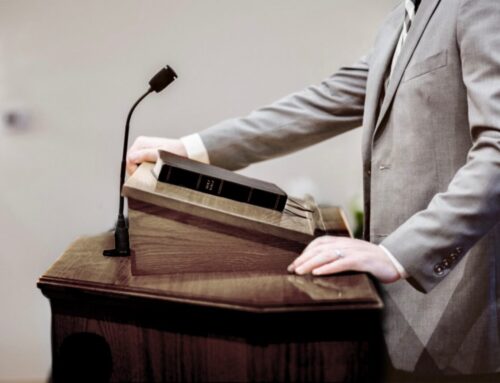Think not that I am come to destroy the law, or the prophets: I am not come to destroy, but to fulfill.
Matthew 5:17 — King James Version
Do not think that I have come to revoke The Written Law or The Prophets; I am not come to revoke but to fulfill.
Matthew 5:17 — Aramaic Bible in Plain English
“Do not think that I have come to abolish the Law or the Prophets; I have not come to abolish them but to fulfill them.
Matthew 5:17 — New International Version
“Don’t ever think that I came to set aside Moses’ Teachings or the Prophets. I didn’t come to set them aside but to make them come true.
Matthew 5:17 — God’s Word Translation
“Don’t think that I have come to abolish the Torah or the Prophets. I have come not to abolish but to complete.”
Matthew 5:17 — Complete Jewish Bible
Matthew Henry’s Concise Commentary
Matthew 5:17-20 Let none suppose that Christ allows his people to trifle with any commands of God’s holy law. No sinner partakes of Christ’s justifying righteousness, till he repents of his evil deeds. The mercy revealed in the gospel leads the believer to still deeper self-abhorrence. The law is the Christian’s rule of duty, and he delights therein. If a man, pretending to be Christ’s disciple, encourages himself in any allowed disobedience to the holy law of God, or teaches others to do the same, whatever his station or reputation among men may be, he can be no true disciple. Christ’s righteousness, imputed to us by faith alone, is needed by every one that enters the kingdom of grace or of glory; but the new creation of the heart to holiness, produces a thorough change in a man’s temper and conduct.
Thoughts on Today’s Verse
By Elizabeth Haworth
The Law was a large body of rules and regulations given to Israel through Moses, which was summed up in the moral principles of the 10 Commandments. It could not provide Salvation but was God’s tool to reveal our sinfulness, to bring us to repentance and to point us to Christ – our sinless-Saviour and kinsman-Redeemer.
Adam’s sin in the garden placed all men under the curse of death, and God gave the Law to a tiny segment of humanity to demonstrate to a fallen world the sinful nature within the heart of every man. To break one part of God’s perfect Law was to fail in every aspect, and Israel’s miserable failure pronounced all men guilty before a holy God, and the wages of sin is death – eternal separation from our heavenly Father and spiritual death for the soul of every man.
God is holy and God is righteous and God demands that full payment for our sinfulness is made – and the wages of sin is death. Humankind is a race of guilty sinners but God in His love and grace gave His only begotten Son to be born as “Jesus” – Messiah of Israel and Saviour of the world. The eternal Son of God became the incarnate Son of Man, to become the single Substitute for sin – for a race of condemned sinners.
Jesus was born under the Law, lived a sinless life under the Law and by His life and death, met every single demand of God’s holy Law. Jesus did not come to abolish the Law but to fulfill its righteous requirements – and He became the only Man who met its perfect demands – qualifying Him to become our sin-Substitute.. our kinsman-Redeemer
Jesus was the one and only Man who met the legal demands of God’s Law – fully satisfying its righteous requirements on our behalf. NO, Jesus did not come to abolish the Law – Jesus can to fulfill the Law, and this He did through His sinless life – and He did this on behalf of you and me – and for all who believe on His name. Jesus willingly chose to pay the enormous price of sin.. for you and for me, so that all who believe in Him are no longer under the curse of the Law, but under God’s gift of grace.
As born-again believers we died in Christ, and are rendering dead to the Law – removing forever it’s fearful curse and eternal consequences. He gave us His life so that we could live our life through HIM..
My Prayer
Heavenly Father, I confess that I am a guilty sinner and deserving of punishment for my sin. Thank You that in You grace You gave the Lord Jesus to live a sinless life and take the punishment for my sins. Thank that that through His life and death I have been removed from the curse of the Law and set free from Your righteous condemnation – because Jesus took the punishment for my sin – and in my place. Thank You Father, in Jesus name, AMEN
Gill’s Exposition of the Entire Bible
Matthew 5
Think not that I am come to destroy the law or the prophets,…. From verse 3 to the 10th inclusive, our Lord seems chiefly to respect the whole body of his true disciples and followers; from thence, to the 16th inclusive, he addresses the disciples, whom he had called to be ministers of the word; and in this “verse”, to the end of his discourse, he applies himself to the whole multitude in general; many of whom might be ready to imagine, that by the light of the Gospel, he was giving his disciples instructions to spread in the world, he was going to set aside, as useless, the law of Moses, or the prophets, the interpreters of it, and commentators upon it. Christ knew the thoughts of their hearts, that they had taken up such prejudices in their minds against him; wherefore he says, “think not”; he was sensible what objections they were forming, and what an improvement they would make of them against his being the Messiah, and therefore prevents them, saying,
I am not come to destroy, but to fulfil. By “the law” is meant the moral law, as appears from the whole discourse following: this he came not to “destroy”, or loose men’s obligations to, as a rule of walk and conversation, but “to fulfil” it; which he did doctrinally, by setting it forth fully, and giving the true sense and meaning of it; and practically, by yielding perfect obedience to all its commands, whereby he became “the end”, the fulfilling end of it. By “the prophets” are meant the writings of the prophets, in which they illustrated and explained the law of Moses; urged the duties of it; encouraged men thereunto by promises; and directed the people to the Messiah, and to an expectation of the blessings of grace by him: all which explanations, promises, and prophecies, were so far from being made void by Christ, that they receive their full accomplishment in him. The Jews (t) pretend that these words of Christ are contrary to the religion and faith of his followers, who assert, that the law of Moses is abolished; which is easily refuted, by observing the exact agreement between Christ and the Apostle Paul, Romans 3:31 and whenever he, or any other of the apostles, speaks of the abrogation of the law, it is to be understood of the ceremonial law, which in course ceased by being fulfilled; or if of the moral law, not of the matter, but of the ministry of it. This passage of Christ is cited in the Talmud (u), after this manner:
“it is written in it, i.e. in the Gospel, “I Aven”, neither to diminish from the law of Moses am I come, “but”, or “nor” (for in the Amsterdam edition they have inserted between two hooks), to add to the law of Moses am I come.”
Which, with their last correction, though not a just citation, yet tolerably well expresses the sense; but a most blasphemous character is affixed to Christ, when they call him “Aven”; which signifies “iniquity” itself, and seems to be a wilful corruption of the word “Amen”, which begins the next “verse”.
(t) R. Isaac Chizuk Emuna, par. 2. c. 10. p. 401. (u) T. Bab. Sabbat. fol. 116. 2.
Jamieson-Fausset-Brown Bible Commentary
Matthew 5:17-48. Identity of These Principles with Those of the Ancient Economy; in Contrast with the Reigning Traditional Teaching.
Exposition of Principles (Matthew 5:17-20).
17. Think not that I am come—that I came.
to destroy the law, or the prophets—that is, “the authority and principles of the Old Testament.” (On the phrase, see Matthew 7:12; 22:40; Luke 16:16; Acts 13:15). This general way of taking the phrase is much better than understanding “the law” and “the prophets” separately, and inquiring, as many good critics do, in what sense our Lord could be supposed to meditate the subversion of each. To the various classes of His hearers, who might view such supposed abrogation of the law and the prophets with very different feelings, our Lord’s announcement would, in effect, be such as this—”Ye who tremble at the word of the Lord, fear not that I am going to sweep the foundation from under your feet: Ye restless and revolutionary spirits, hope not that I am going to head any revolutionary movement: And ye who hypocritically affect great reverence for the law and the prophets, pretend not to find anything in My teaching derogatory to God’s living oracles.”
I am not come to destroy, but to fulfil—Not to subvert, abrogate, or annul, but to establish the law and the prophets—to unfold them, to embody them in living form, and to enshrine them in the reverence, affection, and character of men, am I come.
Matthew 5:17 Additional Commentaries








Leave a Reply, please --- thank you.